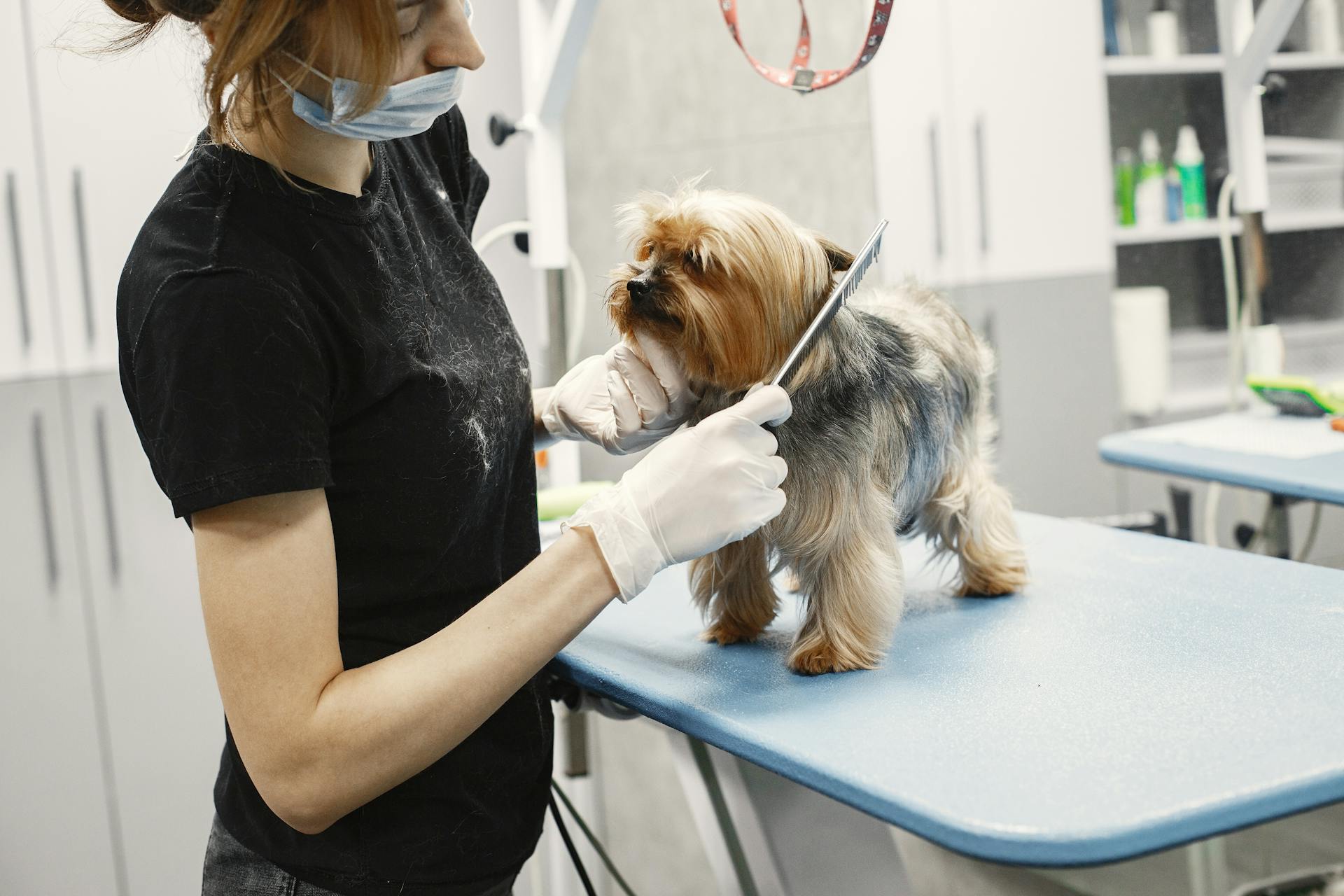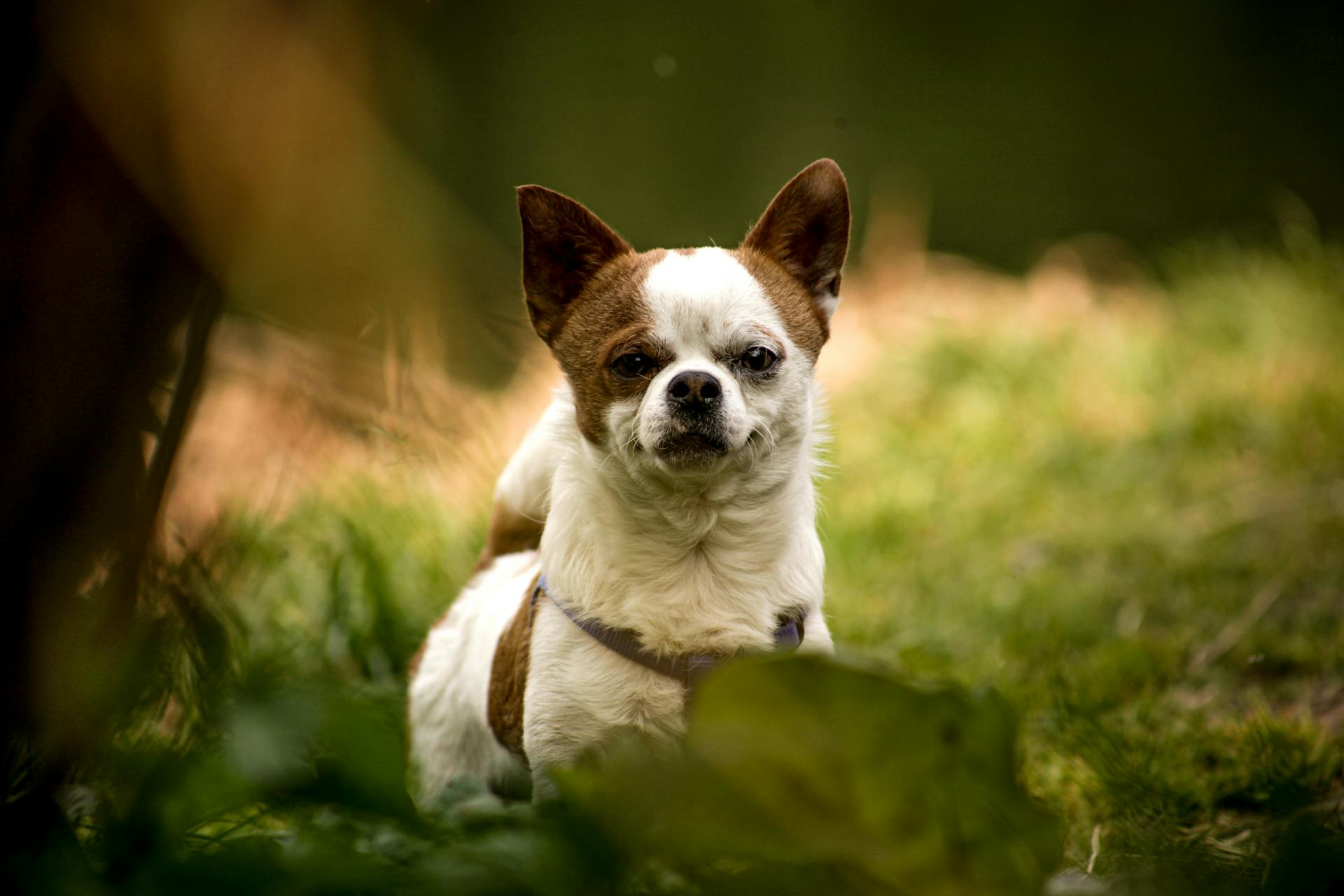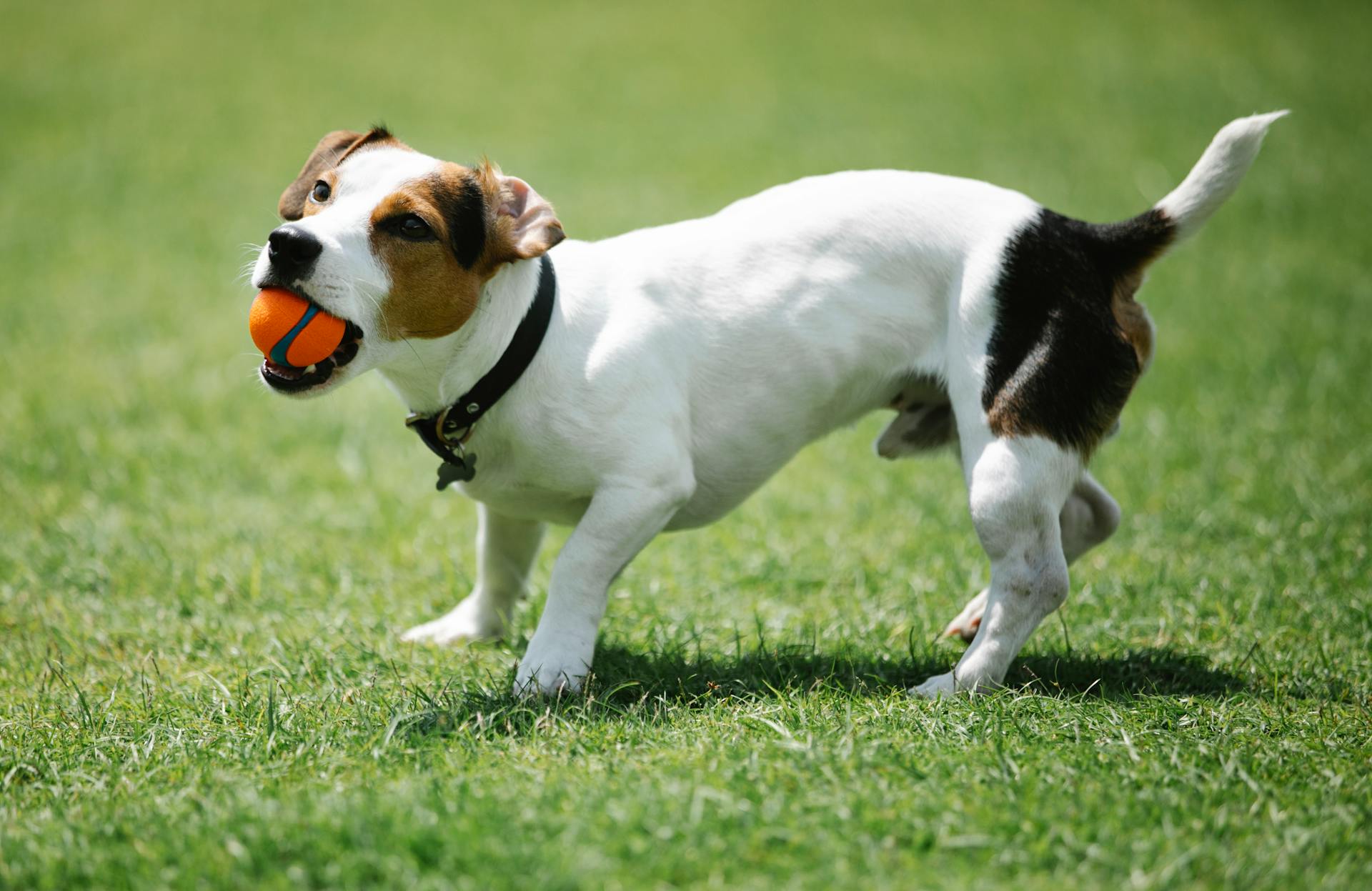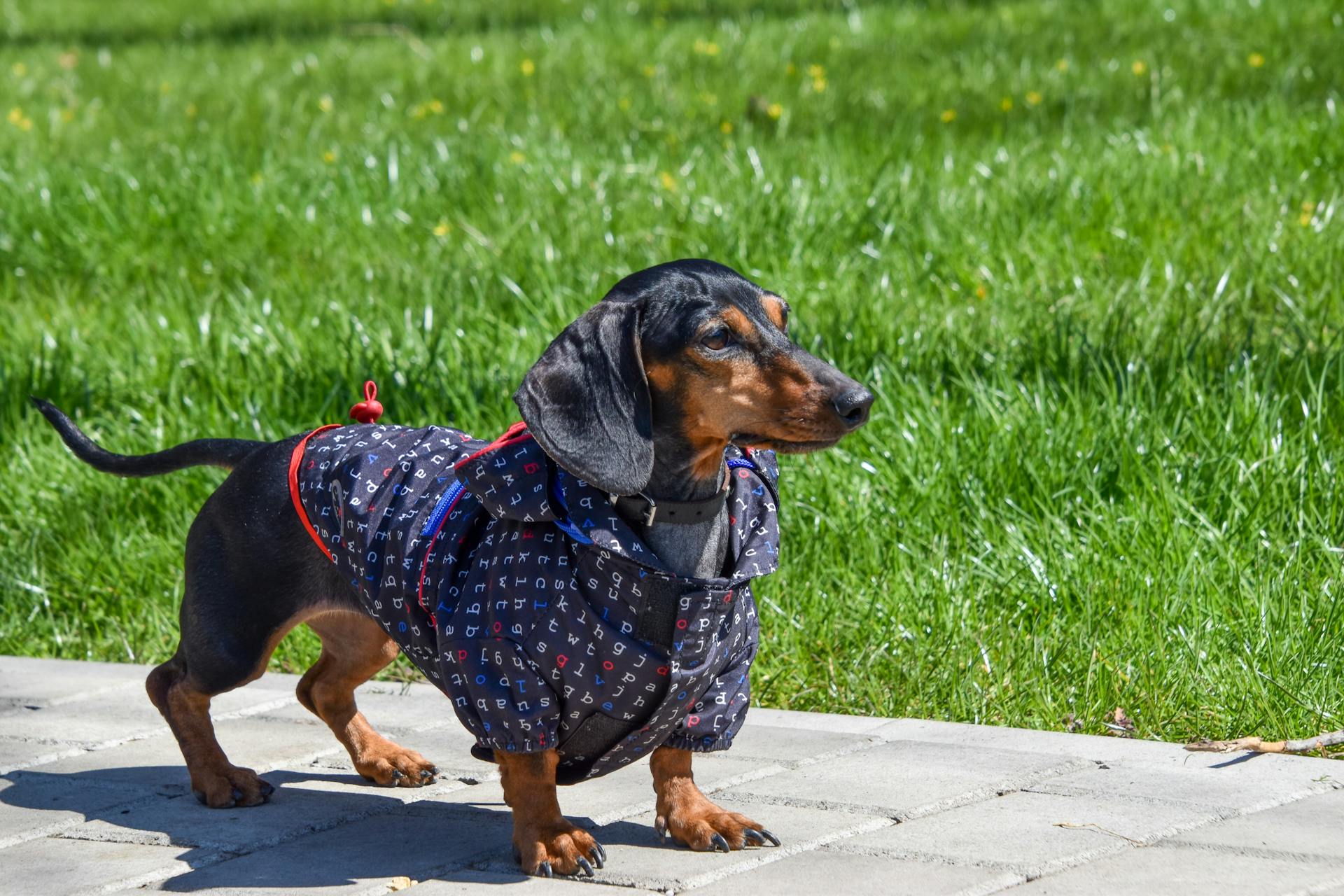
Short hair Chiweenies are adorable, energetic dogs that require special care. They are a cross between a Chihuahua and a Dachshund, weighing between 8-18 pounds.
Their short coats are easy to maintain, but they still need regular grooming to prevent skin problems. This includes daily brushing and occasional bathing.
Chiweenies are intelligent dogs that can be trained with positive reinforcement. They thrive on attention and interaction with their owners, making them excellent family pets.
Short hair Chiweenies are generally healthy dogs, but like all breeds, they can be prone to certain health issues, such as patellar luxation and hypoglycemia.
Temperament and Behavior
The Chiweenie's temperament is a unique blend of its parent breeds' traits. They are generally sweet and loyal companions that adore their owners and love affection.
Chiweenies are known to be one-person dogs, bonding closely with one or two people and not caring much about others. This can make them great companions for families, but also means they may not be as outgoing as other breeds.
Explore further: Short Haired Dogs Breeds
They are naturally nervous dogs, which can make them difficult to socialize if not done properly. Socialization is crucial to prevent them from becoming reactive around other people and dogs. With the right training and exposure, they can become fantastic companions.
A key thing to keep in mind is that Chiweenies are not ideal for families with young children. They can be short-tempered, feisty, and snappy, making them unsuitable for households with little ones.
Here are some key characteristics to consider when thinking about bringing a Chiweenie into your life:
- They are generally sweet and loyal companions.
- They bond closely with one or two people.
- They can be nervous and require proper socialization.
- They may be short-tempered and feisty with young children.
- They are prone to barking and being loud.
What to Know About Mix Temperament
If you're considering bringing a Chiweenie into your family, it's essential to understand their temperament. They're generally sweet, loyal companions that adore their owners and love affection, but they can be quite particular about who they bond with.
One key thing to know is that Chiweenies are often one-person dogs, meaning they tend to form strong attachments to one or two people and may not be as outgoing with others. This is due to their Chihuahua and Dachshund heritage, both of which are known to be nervous breeds.
Socialization is crucial for Chiweenies, as they can become difficult and reactive around other people and dogs if they don't receive proper exposure. This means you'll need to put in the effort to socialize your Chiweenie from an early age to ensure they grow into a well-adjusted adult.
While Chiweenies can make fantastic companions, they're not the best fit for everyone. If you're looking for a dog that doesn't need training and interaction, a Chiweenie might not be the right choice. They require regular training and attention to thrive, and they can be quite stubborn at times.
Here are some key things to consider when thinking about bringing a Chiweenie into your family:
- They may not be suitable for households with young children due to their short temper and feisty nature.
- They can be loud and yippy, so be prepared for a vocal companion.
- Regular grooming is essential, including cleaning their teeth, which can be a challenge.
- They're generally social and love hanging around their owners, but they can be protective of their family and may bark at strangers.
- Early training is crucial to develop good behavior and prevent potential issues.
Remember, every dog is unique, and understanding your Chiweenie's temperament will help you build a strong and loving relationship with your new companion.
Dogs and Kids
Dogs and kids can be a match made in heaven, but it's essential to remember that dogs, especially small breeds like Chiweenies, need to be treated with care and respect.
Chiweenies are generally good with kids and love to snuggle and play with them. They are often picked as family dogs due to their loyal temperament.
Kids should be taught to be gentle with Chiweenies, as they are a small and fragile breed. Dropping a small dog can result in injuries with lifelong consequences.
Children should also be mindful around the Chiweenie's food and toys, and not take away his food bowl or pick up a bone he is chewing on. This can quickly lead to resource guarding.
Chiweenies are very easy to walk on leash due to their small size, making it a great activity for kids to bond with their pet.
Care and Grooming
The short hair Chiweenie is a breeze to groom, but it still needs some attention to stay looking its best. Give its coat some attention every week or so to prevent matting.
You should also expect seasonal shedding, as both parent breeds are prone to it. This means you'll need to brush more frequently during these times.
Brushing frequency will depend on the hair length of your Chiweenie, but it's recommended to brush daily or weekly.
Curious to learn more? Check out: Best Brush for a Cavapoo
What Does it Look Like?
The Chiweenie's appearance can vary greatly, but generally, they have the body of a Dachshund parent, with a long, muscular build and short legs. Their ears are typically long and floppy, just like the Dachshund.
Their coat can be short, long and smooth, or wire-haired, and comes in a wide range of colors, including white, red, brown, and black, or any combination thereof. They can weigh anywhere from 3 to 32 pounds, depending on the size of their parents.
Here's a breakdown of the Chiweenie's size and weight:
Their height typically ranges from 6 to 9 inches, and they can have a variety of coat types, including short, medium, or long, and fluffy or smooth.
Health and Nutrition
Chiweenies are generally healthy, but they can inherit some chronic conditions from either of their parents. Intervertebral disc disease is a common issue, so it's essential to keep an eye on your Chiweenie's back health.
They may also experience teeth issues, patellar luxation, color dilution alopecia, and hip dysplasia. Regular check-ups with your veterinarian can help catch these issues early on.
A well-balanced diet is crucial for maintaining your Chiweenie's overall health. Look for dog food with high-quality protein, essential nutrients, and small kibble sizes to accommodate their tiny mouths.
Here are some key nutrients to look for in your Chiweenie's dog food:
As your Chiweenie ages, their nutritional needs may shift. In their senior years, reducing fat and adding fiber is general advice. Consult with your veterinarian to determine the best diet for your aging Chiweenie.
Health Issues to Be Aware Of
As a Chiweenie owner, it's essential to be aware of the potential health issues that can affect your furry friend. Intervertebral disc disease is a common ailment among Chiweenies, which can cause back pain and mobility issues.
Chiweenies are prone to teeth issues, which can be caused by genetics or a lack of proper dental care. Regular brushing and check-ups with your vet can help prevent these issues.

Patellar luxation is another common health concern in Chiweenies, where the kneecap slips out of place. This can be painful for your dog and may require surgery to correct.
Color dilution alopecia is a condition that can cause hair loss in Chiweenies, particularly those with a dilute coat color. This condition is usually inherited from the parent breed.
Hip dysplasia is a genetic condition that can cause arthritis and mobility issues in Chiweenies. This is often seen in larger breeds, but can also affect smaller breeds like the Chiweenie.
Here are some common health issues to be aware of in Chiweenies:
- Intervertebral disc disease
- Teeth issues
- Patellar luxation
- Color dilution alopecia
- Hip dysplasia
Health and Nutrition
When choosing the right dog food for your Chihuahua Dachshund mix, it's essential to prioritize high-quality protein and essential nutrients. Look for small kibble sizes to accommodate their tiny mouths, and consider a formula that caters to their energy levels and potential joint concerns.
A good dog food should feature real meat as the first ingredient, such as real chicken or beef protein, which helps build and maintain healthy muscles. For example, Blue Buffalo foods always feature real meat as the first ingredient.

For adult dogs, a well-balanced diet should include essential proteins and carbohydrates to help meet their energy needs. Blue Life Protection Formula adult dog food contains omega 3 & 6 fatty acids to promote a shiny coat and healthy skin.
To support immune system health and life stage needs, look for dog food with antioxidant-rich Lifesource Bits. These bits are a precise blend of antioxidants, vitamins, and minerals carefully selected by holistic veterinarians and animal nutritionists.
Here's a breakdown of what to look for in a dog food for your Chihuahua Dachshund mix:
As your dog ages, their nutritional needs may shift. In their senior years, reducing fat and adding fiber is generally recommended to support their overall health.
Training and Environment
Training a short hair Chiweenie requires patience and consistency. They are generally easy dogs to train, but they do need some training to become well-behaved adult dogs.
Potty training is a crucial aspect of training a Chiweenie, as it can take a bit longer than usual for small dogs to learn. You should also focus on socializing your puppy with people and dogs to help them become confident and calm in new situations.
Teaching your Chiweenie to stay alone for a couple of hours is also essential, as they can be prone to separation anxiety. This will help them become more independent and less anxious when you're not around.
Here are some key areas to focus on when training your Chiweenie:
- Potty training
- Socializing with people and dogs
- Teaching them to stay alone for a couple of hours
With consistency and patience, you can help your short hair Chiweenie become a well-behaved and loving companion.
How to Train
Training your Chiweenie or Dachshund Chihuahua Mix puppy requires patience and consistency. These little dogs can be stubborn at times, but with the right approach, you can help them become well-behaved adult dogs.
Potty training is a crucial part of the process, especially for small dogs like Chiweenies. It can take a bit longer for them to learn, so be prepared to invest time and effort.
Socializing your puppy with people and dogs is also essential. This will help them develop good manners and reduce the risk of separation anxiety.
For more insights, see: Brown Chiweenie Puppy
To avoid common training mistakes, make sure to start obedience training from a young age. This will help you establish a strong bond with your puppy and lay the foundation for future training.
Here are some key areas to focus on when training your Chiweenie or Dachshund Chihuahua Mix puppy:
- Potty training
- Socializing with people and dogs
- Teaching them to stay alone for a couple of hours (to prevent separation anxiety)
Remember, every dog is different, and some may require more time and effort than others. But with the right approach and a lot of love, you can help your puppy become a well-behaved and loving companion.
Optimal Environment for Cross-Breeds
Creating an optimal environment for your cross-breed is crucial for their health and happiness.
Chiweenies, for instance, can adapt to small apartments, but it's essential to have as few stairs as possible to prevent disc dislocation and other skeletal problems.
A PawRamp can be a great investment to help your little pup climb on furniture safely.
If you have a yard, make sure the pickets on your fence are dense enough to prevent your dog from running off to the street and getting hurt.
Frequently Asked Questions
Do Chiweenies have hair or fur?
Chiweenies typically have short, smooth coats, but some may have longer, silky hair around their body and ears. Their coat type can vary, but it's generally considered low-maintenance.
Featured Images: pexels.com


